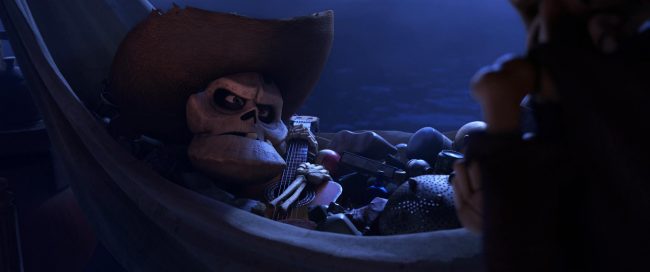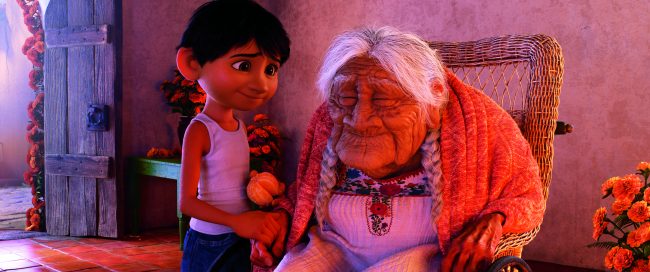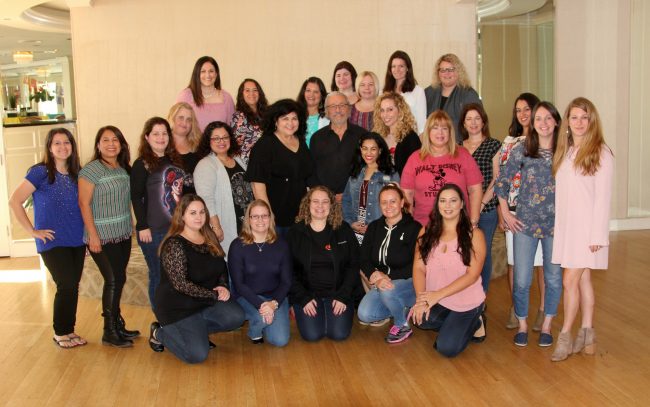There’s an old saying that there are no small parts, and that’s so true in Disney Pixar’s new film Coco. One of the smallest roles in terms of screen time is that of the character Chicharron, voiced by Edward James Olmos. The character is only on screen for a couple of minutes and doesn’t have many lines, but the scene about Chicharron is one of the most important and heartbreaking of the entire film. It reveals what happens to you when you’re forgotten, and it sets up the whole second act of the movie.
A few weeks ago, I had the chance to interview Edward James Olmos about his character and his role, as well as what the film itself means to him.
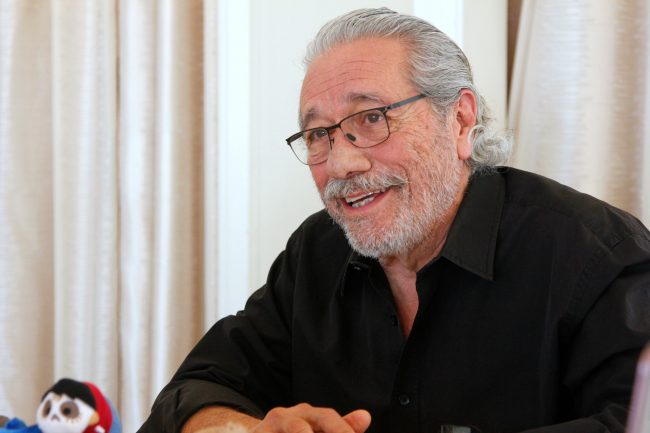
Did this movie make you cry?
Thinking about my grandparents, my great-grandparents, it just conjures up the reason why we are who we are. You start to get into your memory of where you come from and who made you that way and especially with your parents. You start with them. This was very emotional for me. Even right now thinking about it I get emotional.
How would you like to be remembered?
Amongst my family, hopefully they’ve shared enough time with me and I’ve shared enough time with them and remember the times that we spent together. I mean, so many different stories, but just to remembered in a way that empowers them would be nice.
What statement does the film make?
It’s pretty simple. The film itself is very direct in making you feel that the Day of the Dead is a very needed moment in everybody’s life. Everybody has their own way of dealing with their past and where they come from and each culture has their own way of doing it and it’s wonderful when you learn about it, but this is the first time that I’ve ever seen this explained so simply. And that’s why I took the role. My part is a cameo, but it’s very intrinsic to the story. You really realize what happens when no one thinks of you anymore.
How did you draw on your own experiences for the role?
They invited me to Pixar and asked me to come down and they wanted to talk to me about this movie that they were making. And I said I’d love to and I went down and I saw their studios and I saw the, their creative space and it’s beautiful. It’s just wonderful. I went down there and they told me the story. I didn’t know the whole story. I never read the whole script, I knew my little portion of it which was directly related to the characters I worked with, Hector and little Miguel, and that was it. That’s what I knew and they had told me it dealt with family and it dealt with remembrance.
And I know about the Day of the Dead and we have celebrated the Day of the Dead since I was born and it’s an integral part of living inside of a Mexican household. We would always go and celebrate the Day of the Dead with my great-grandparents, my great-great grandparents. And we’d always go around where they were all buried at the Evergreen Cemetery in East L.A.
What message do you have for people who may be scared to go see the film?
I think we have right to be defensive of our culture because the art forms have a tendency to exploit. They romanticize, glamorize, exploit the material. They try to make money with it and in a way, that’s what it is. This is a business. But in a case like this, this is probably the most effective and the most important film that’s come out of the Hollywood system because at this moment in time especially, no one knew six years ago when they started to do this that it would come out in this year, this month and the situation would be what we’re experiencing right this moment.
So I mean, for us to be at this level right now and be able to sit here and be happy about something that touches every single person no matter where you come from, what your roots are, all it does it make you think about where you come from and who you are. Without being able to understand where you come from, it’s really hard for you to be here. You’re constantly wondering- say you’re an orphan and you don’t know anything about your past. You have no idea, you’re constantly searching for that reality and trying to find out something to help me nail me down a little bit more, understand myself better. Who am I? I was raised by my great-grandparents. I just had a very emotional experience upstairs talking about this.
To talk about these people that don’t want to give it a chance, fine. Don’t. I can’t help them. Sadness is that this, if exposed to a two or three or four, five year old child, will burn itself into their system and their whole way of being and will end up making them whole. They’ll never forget the people who took them to see it. Let alone, they’ll never forget who they are, where they come from. Just like the final [part] when he’s there telling his sister, “And this is your this, and this is…” It’s so emotional.
My father’s gone and everyday I think about him. I don’t just think of him on Day of the Dead. I think about him every single day.
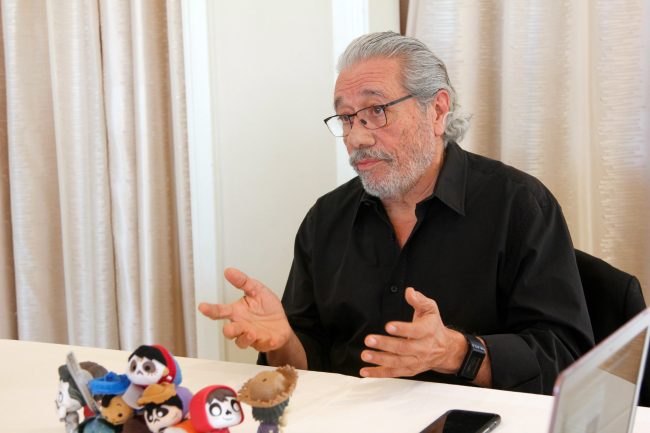
Do you have any special memories of Day of the Dead from growing up?
Yeah, the party. It was a party. It was a celebration of life, of living, with conjuring up the understanding of those that got you there. You’re just saying thank you to them. Thanks for bringing me to this space and here we are around your tomb or your gravesite and we put flowers and little candles and their picture and their food. I bring my dad his menudo. We just sit there and laugh. And cry. There’s a lot of crying and especially the older you get. The closer you get to being in the hole, the closer you are to understanding what life really is. But that’s the reality of our life. We have to celebrate it.
Why is Chicharron forgotten and what do you think we can do to avoid being forgotten?
Just be happy around those that you love. I always try to be happy and I was always up because it’s a choice. I could have woke up this morning and said, “Oh, I have to do so much of this stuff. I gotta do this, what a day.” But instead, I woke up and I said, “Well, I got to do all this stuff, yeah, but guess what? I woke up.”
How is this movie now shaping your own experience with your family?
[SPOILERS]
It always has been a part of my family, Day of the Dead has always been an integral part of our family. But in essence, this is an ability to understand that this will live for the duration of humanity. This piece of art will be around as long as any piece of art can be around. It’ll be passed on, so I’m very grateful. I play an integral part to the story, because you really realize what it is that we’re doing and what this is about. And when I finally said to Hector, I say, “Hector, play me my song. Oh, I can’t play it. No. Play me my song. You want the guitar, you play me my song. You took my femur and you never gave it back, so play me my song.” Okay. And then when he closes his eyes and he finally just gives it, oh, thank you. And then the little boy goes, “Whoa, what happened?”
And that’s when Hector says, “Well, that’s what happens when people don’t think about you anymore. You disappear.” And “Where’d he go?” “I don’t know.” It’s not about religion, far from it. It’s not about belief in heaven and earth and all that. It’s all about just the understanding of what we conjure when we’re here. Not one of you can be here without thinking about who got you here and if you don’t do it daily, you’re missing the day and that’s really the key to just being thankful.
Disney Pixar’s Coco is playing in theaters right now! Don’t miss these printable Coco coloring pagesand activity sheets, and be sure to catch my interviews with other stars from the film!

